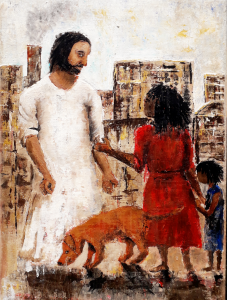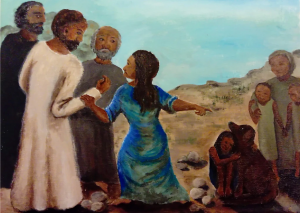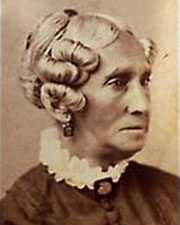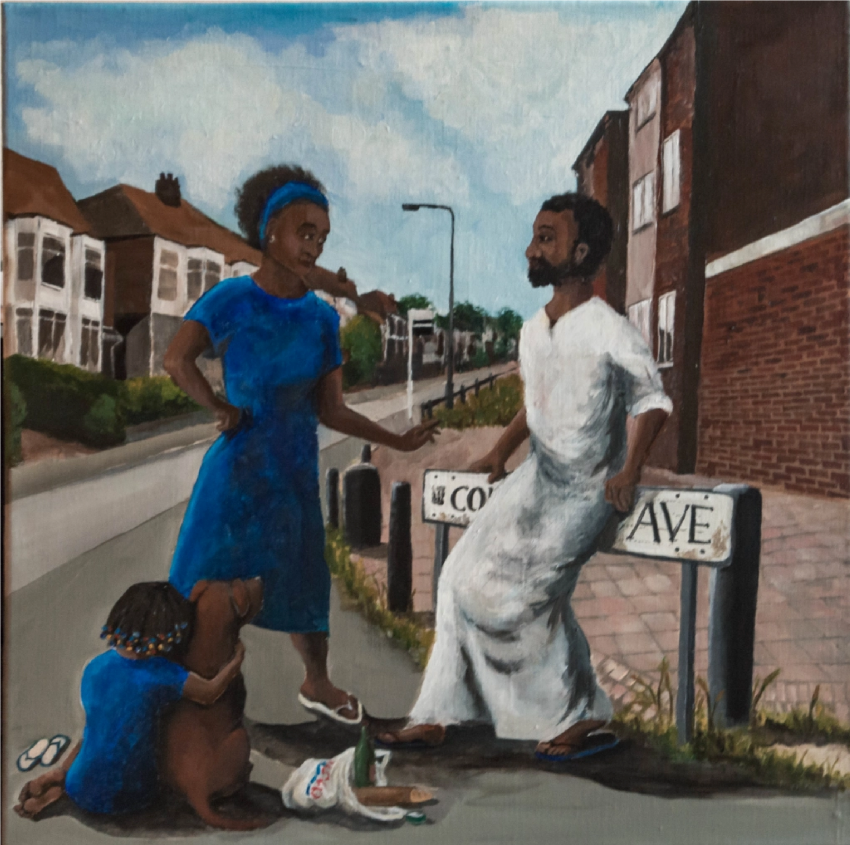Above: © Ally Barrett (www.reverendally.org), used by permission.
“Crumbs”—A Sermon
Jesus left that place and went away to the district of Tyre and Sidon. 22Just then a Canaanite woman from that region came out and started shouting, “Have mercy on me, Lord, Son of David; my daughter is tormented by a demon.” 23But he did not answer her at all. And his disciples came and urged him, saying, “Send her away, for she keeps shouting after us.” 24He answered, “I was sent only to the lost sheep of the house of Israel.” 25But she came and knelt before him, saying, “Lord, help me.” 26He answered, “It is not fair to take the children’s food and throw it to the dogs.” 27She said, “Yes, Lord, yet even the dogs eat the crumbs that fall from their masters’ table.” 28Then Jesus answered her, “Woman, great is your faith! Let it be done for you as you wish.” And her daughter was healed instantly. – Matthew 15:21-28
“I Desire Mercy”
When I told a fellow minister that I would preach from this text in Matthew and to ask her to pray for me, she responded, “Certainly praying. That’s a tough text.” Truer words have never been spoken, for in this passage, Jesus uncharacteristically ignores and then speaks harshly to this Canaanite woman who is seeking healing for her daughter. This unnamed woman had foreknowledge of Jesus’ messiahship, as she addressed him as “Lord.” She knew that he was descended from the lineage of David, and it is evident that she knew of Jesus’ reputation as a healer of the sick and infirmed. So, it made sense that, as Jesus made his way into the Gentile territory of Tyre and Sidon, this Canaanite woman begged him to have mercy and to heal her daughter.
According to the writer of the Gospel of Matthew, mercy is central to Jesus’ ministry. In yet another encounter with the Pharisees and scribes—the religious folk of his day—Jesus was questioned about the disciples’ failure to keep the ritual of washing their hands before eating. They were more concerned about dirty hands and ritual purity than clean hearts. They were more concerned about the law than extending grace. In response to the Pharisee’s concern, Jesus quoted Hosea 6:6—“I desire mercy, not sacrifice.”
When approached by this Canaanite (or Gentile) woman and her request for mercy, Jesus initially remains silent. Jesus’ disciples, supposing that the woman is bothering him, suggest that Jesus send her away, to which Jesus responds, presumably to the woman, “I was sent only to the lost sheep of Israel.” In other words: you are not an Israelite; you are a Canaanite, from the lineage of people who, from antiquity, have been considered idol-worshipping enemies and foes of the Israelites.
Audacious Appeal
However, this woman would not take Jesus’ proclamation as the final word. She audaciously walked up to him and once more requested that he have mercy on her and heal her daughter. Her boldness and persistence were inappropriate, countercultural, anti-social behavior for a woman of her time, much less a woman who was not of Jewish descent. The woman persists, kneeling before Jesus, taking a worshipful stance, and begs, “Lord, help me!”

Uncharacteristically, Jesus answers, “It is not fair to take the children’s food and throw it to the dogs.” Wait—what is happening? This isn’t the Jesus we know—the one who heals the sick and infirmed, the Jesus who gravitates towards the marginalized—tax collectors, women of ill repute, lepers, children . . . Why would Jesus respond so harshly? Commentators have several theories about Jesus’ response, including that he was “just kidding,” or that the interpreter of this passage was an Israelite who recorded Jesus’ response based on their personal prejudice, or that by dismissing the woman, Jesus alleviated further vexation from the Pharisees and scribes. One commentator explained Jesus’ response this way, stating: “The ‘food’ [Jesus] brings is intended for the children, not the dogs. He is saying that the doctrine of the election of Israel—a doctrine that, in the hands of the religious leaders who are so critical of him, has become one of favoritism, exclusion, and contempt—means that she cannot receive mercy.”[1]
I don’t know whether Jesus’ response was recorded incorrectly or if we should accept that Jesus was having a difficult day. What I do know is that Jesus’ response, as recorded, is counter to his belief that washing hands and other religious restrictions and traditions do not guarantee that a person is in right relationship with God or with neighbor.
Eating the Crumbs
And yet, that Canaanite woman persevered, acknowledging that she did not have a problem with Jesus having mercy on the Israelites, and she still had hope because, as she put it, “even the dogs eat the crumbs that fall from their master’s table.”
People of God, this pericope is reminiscent of the enslavement of people of African descent in this country. Many times, they, too, just desired to eat the crumbs from the master’s table. A time when the masters and mistresses of the manor felt that it was godly to treat people with skin as black as the soil as something other than human—thought it their God-given right and authority to enslave humans to destroy their dignity, their culture, their families—to deny their very humanity and to act as if their only value was that of a commodity to be bought and sold, tortured, maimed, used for their pleasure or amusement or killed just for having the audacity to want to be treated humanely.
Frederick Douglass wrote in My Bondage and My Freedom:
I have often been so pinched with hunger, that I have fought with the dog—’Old Nep’—for the smallest crumbs that fell from the kitchen table, and have been glad when I won a single crumb in the combat . . . . Many times have I followed, with eager step, the waiting-girl when she went out to shake the table cloth, to get the crumbs and small bones flung out for the cats.

This persistent Canaanite woman, this mother with a sick daughter at home, desperately, humbly, and reverently falls at Jesus’ feet, seeking mercy. Jesus then acknowledges that she, too, is God’s daughter, a sheep from another pasture, faithfully seeking after God, and he now responds, “Woman, great is your faith! Let it be done for you as you wish.” Jesus recognized the woman’s humanity, need, and, most importantly, her faithfulness to God, and he healed her daughter instantly.
The Call on the Christian
It does not matter whether we are liberal, conservative, independent, or agnostic. The true test of our Christianity is whether we are being faithful, whether we are doing the will of God—especially those of us who are called to preach and teach the gospel. Siblings, we are not called to stand by silently, to ignore injustice, discrimination, or racism, to turn our heads and hearts away from the oppressed, the immigrant, the tired, the poor, or those who are othered. Our God-ordained responsibility is to audaciously demand compassion, charity, care, companionship, mercy, and grace be placed on the table so that people can be fed until they want no more. Crumbs from the table never satisfied anyone!
Favoritism, exclusion, contempt, xenophobia, sexism, genderism, and racism are all evident today, as those in power are making decisions that have the greatest negative impact on people who already live in poverty. Rather than welcoming those who only want a better standard of living, hard-hearted people—in the name of Christianity—are vilifying, oppressing, and forcibly expelling these “others” from communities. “Give us your tired, your poor, your huddled masses yearning to breathe free”—this no longer applies in these United States of America!
My pastor colleague was right. This is a tough text—not because of Jesus’ initial reaction to the Canaanite woman, but because it challenges us to place ourselves in the role of people who society deems as “other,” unworthy, or valueless and to look beyond race, ethnicity, or nationality, to look beyond gender or sexual identity or orientation, to look beyond infirmity or disease, to look beyond social status or standing, to look beyond our preconceived prejudices and “isms” and to see people’s need—to not stand in judgment, but to respond with mercy, grace, and love—to be merciful, as we are loved, all created in the image of God.
Beloved, when we gather at the Lord’s table, may Christ’s spiritual nourishment feed us until we are filled, empower us to speak truth to power, and prepare us to stand with the least, the lost, and the left behind.
[1] Iwan Russell-Jones, “Theological Perspective on Matthew 15: (10–20) 21–28,” in Feasting on the Word: Preaching the Revised Common Lectionary: Year A, ed. David L. Bartlett and Barbara Brown Taylor, vol. 3 (Louisville, KY: Westminster John Knox Press, 2011), 358–360.

The Rev. Dr. Patrice Fowler-Searcy ’13/’24 retired as the acting pastor and head of staff at the East Liberty Presbyterian Church, where prior to her ordination in the PC(USA) in 2016, she served for 20 years as the director of mission ministries and liaison to the East Liberty community. She currently serves as president of the board of East Liberty Development Inc., where she has served since 1998. Patrice also serves on the Pittsburgh Theological Seminary Board of Directors, where she chairs the Governance Committee and serves on the Executive and SLEM committees. In 1999, in recognition of her service and dedication to the East Liberty community, Patrice was selected as one of 50 individuals nationwide to participate in the Harvard Divinity School Summer Leadership Institute for Church-based Community Development. Patrice is also a 2023 Princeton Theological Seminary Black Theology Leadership Institute Fellow. She previously served on the Pittsburgh Clergy Consortium, Pittsburgh Unites, the East End Growth Fund, the Western Pennsylvania Support Association of Oikocredit and Oikocredit USA, and as a charter board member of the Community Theater Project Corporation Inc. (Kelly-Strayhorn Theater).
Read Next




1 thought on “Audaciously Demanding Compassion – American History and the Syrophoenician Woman”